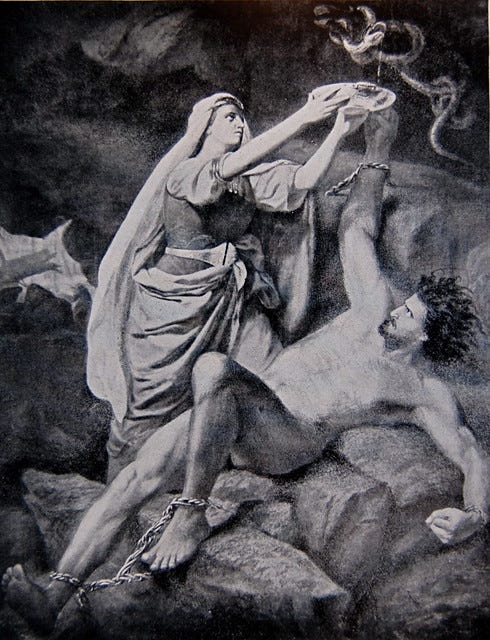Hi friends. This last month has been a rollercoaster of so many big, big, big emotions of every single variety. Some of this was collectively felt and some moments were personal, and as always life is such a mix of the beautiful and the impossible. I wrote the below in the immediate days following the election while still turning over this book in my mind. As we hit the one month mark of processing, there is nothing I can say about this moment that other people smarter than I haven’t said. Still, I think it’s important for all of us to find the shape of our own hope, to imagine a future compelling enough to keep moving towards. Writing helps me do that, and I hope that whatever helps you, you’re finding your way.
revisiting queer trickster resistance
Here we are. On the other side of yet another US election. In the midst of climate disaster, genocide, war, and unrest. Watching the leaves turn against 70 degree weather. Here we are, right here, feet on ground. Come what may.
First, I’ll say that in my personal belief system, electoral politics play a harm reduction role at best. I do not expect to be offered a candidate that truly reflects my politics, my needs, or my beliefs. I instead expect to find myself making a choice that I believe will cause the least amount of imminent harm to the people I love in this world. Like so many other choices, there is no option that causes no harm. To me, it’s helpful to frame what this is and what this isn’t so that I can understand what has been and what has not been lost. As adrienne maree brown and autumn brown said in a recent podcast epsiode, electoral politics can be an act of choosing one’s terrain and choosing one’s opponent, not an act of avoiding conflict or finding a political home.
In spite of my lack of enthusiasm, or maybe because of it, I’ve found myself sitting in fear, sadness, and grief in the days since the results came through. I know these feelings are not a place to rest, but a companion. Because grief is a part of this, intertwined with our other feelings and the ways we show up in the world. If nothing else, the last year has taught me that much.
As a part of delving into my mother’s lineage and my own beliefs, I have found myself continuously drawn to the stories and deities of Norse myth and these ancestral ideas of world building. And amidst that, I have been thinking once again about Loki.
Loki is a figure who I have written about before. He represents the queer, the monstrous (complementary!), the trickster, the cunning. He is a genderless force of chaos that enables and counteracts the perceived order of the larger Norse pantheon. To read the story of Loki, on its surface, is to see reckless mischief in action. But, to take a step back and view his actions as a long-term arc, they indicate level of strategic thinking and sacrifice that is bringing me inspiration in these times of renewed and continued chaos.
The epic poem Lokasenna tells the story of Loki’s arrival at a dinner party in the middle of the sea, attended by all of the Norse gods, who are congratulating themselves on their strength and power. Loki is told that he is not welcome, and is offered bribes to leave. But this is Loki, so of course he crashes the party to engage in the time-honored queer tradition of “ruining” family dinner by telling people (In this case, the gods.) about themselves. [Feel free to draw strength from this legacy at your next family holiday!]
He airs all of his grievances, the hurt he feels when Odin breaks their blood oath of siblinghood, and the hypocrisy of the gods. It is not the first or only time that a character calls the gods into question, naming their abuses of power, but it is certainly the most blatant. This is open rebellion and it is, unsurprisingly, not received well.
Loki is caught by the angered gods and placed in horrific captivity. His sons are killed, despite their innocence and Loki is bound in a cave by the entrails of his own child, under a constant stream of burning venom. This punishment is given for his dinner party tirade, but it is also framed as retribution for the death of Baldur, the most beloved of the gods, which Loki is believed to have played a role in. To rob someone of life is a terrible act, and this is seen as one of Loki’s greatest crimes.
But, this is myth and the crime isn’t the whole story. In sending Baldur, who represents hope and light, to the underworld, Loki ensures that he will survive the apocalypse. Baldur’s death is his survival, his end becoming a beginning when is he the first to arrive at the dawn of a new world. At his own expense, Loki created the conditions for a better future and saner stewardship.
It is the events of Lokasenna more than any other that bring about Ragnarok, when Loki gathers his children to bring about the end of the world. And with that end, a new beginning. This is not chaos for chaos’ sake, this is principled protest. In these times, I am thinking of what it means in this time to gather one’s kin, to find beauty in what the world deems monstrous, and to use our gifts of shapeshifting, of togetherness, and of cunning to remake a world.
During Loki’s suffering, he is attended by his wife, Sigyn, who holds a bowl aloft to catch the burning venom and spare him some suffering. Sigyn is a little studied figure in the myths, often framed as meek or weak if she is spoken about at all. But I am awed by her strength.
Sigyn too is in deep grief at the death of her children, but she does not hide. She chooses the burden of constant care so that her loved one might have some relief. She inserts herself into Loki’s punishment with love and solidarity, representing the crucial importance of showing up in all of the ways that aren’t loud and shiny, but still matter deeply. Even when she’s hurting, even when she can’t stop all of Loki’s suffering, she does what she can.
What does it mean to hear grief echoing through every chamber of your being and still choose to keep going? To tell our kin that they will never suffer alone. That we will be there to hold the bowl and all of its venom, no matter how heavy it gets. What strength could we find in ourselves if we knew that of all the terrors at the edge of the shadows, we would face none of them alone?
As we strategize towards what’s next, how do we leverage our queerness, our perceived monstrosity, the inherent cleverness of queer survival to break what must be broken? How do we pair the strategy of Loki with the solidarity of Sigyn so that we might endure and shape what must be endured and shaped?
I know this because post is more thought-based than action based, because well, there are people who have been doing this work longer and closer who know way better than I do. But here are some guiding resources I have been turning to:
How to survive the apocalypse (again) by Kai Cheng Thom for Xtra
Here’s How We Can Help Each Other in Trump’s America (and Beyond) by Nico at Autostraddle
10 ways to be prepared and grounded now that Trump has won by Daniel Hunter on Waging Nonviolence
Rest in Power and Rest in Peace to Dorothy Allison
Dorothy joined her partner in the next realm on November 6th. She used her words like a righteous sword, she made space for stories that were not often told, and she told the truth over and over again.
May we make our ancestors proud in this impossible moment. May we feel their strength at our backs. May we reach out to them in the darkness.
in love and grief,
lisa






